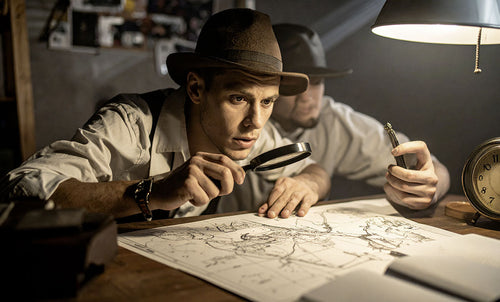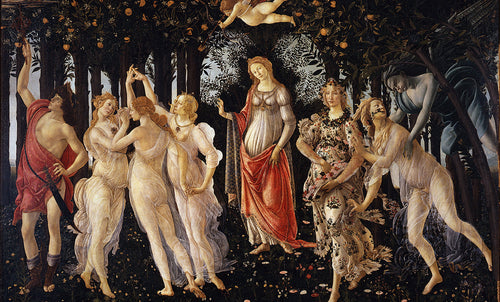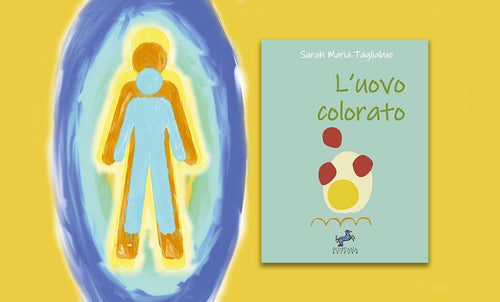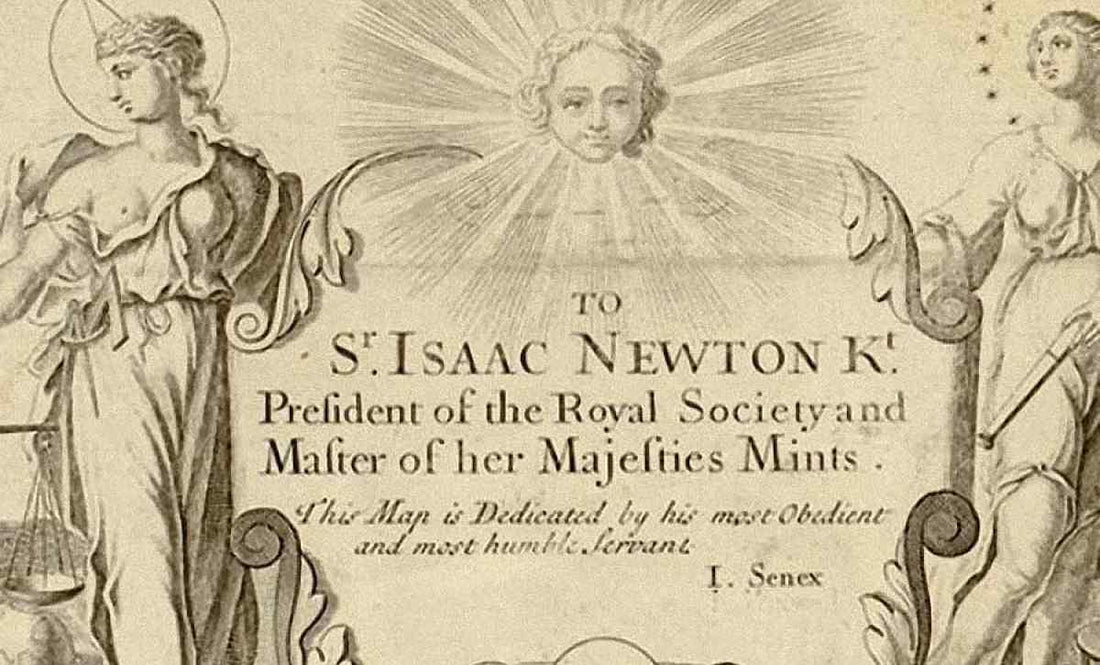
Philosophical Transactions III
Leonardo AnfolsiAs we had explained in the previous issues of NitroGeno, the Philosophical Transactions is a review published since the XVII century that stands at the very beginning of the foundation of the Royal Society, starting with the first scientific and humanistic annotations of Samuel Hartlib.
In those times there was not any prudery about the argument, so that in the Philosophical Transactions we can find a certain quantity of alchemical pages where Newton, Boyle, Oughtred and other alchemists published their insight, researches and, in this case, annotations.
The multiple life of Mr. Oughtred
Here is more about Alchemy on the Philosophical Transactions of the Royal Society. NitroGeno presents you an introduction to William Oughtred RSS written by John Aubrey (1626 - 1695) and Some Practical Observations on May Dew from the Philosophical Transactions of the Royal Society (British Museum MSS. Sloane 698.)
A diary and practice given by Mr. Oughtred to Mr. Thomas Henshaw, from whose MSS. I copied it. June 6th. 1668.

First of all, to introduce the theme I want to quote Wikipedia because it seems to me peculiar the way in which alchemy, astrology and, therefore, W. Oughtred are considered in this note, even considering the final result of these lines; so, yes, the man actually was interested in such matters but, to know it for sure, we have to loom together echoes of facts, gossip and literary quotes. So, what about Philosophical Transactions, where the matter is black on white?
“Oughtred had an interest in alchemy and astrology. The testimony for his occult activities is quite slender, but there has been an accretion to his reputation based on his contemporaries. According to John Aubrey, he was not entirely sceptical about astrology. William Lilly, an eminent astrologer, claimed in his autobiography to have intervened on behalf of Oughtred to prevent his ejection by Parliament in 1646. In fact Oughtred was protected at this time by Bulstrode Whitelocke. Aubrey states that (despite their political differences) he was also defended by Sir Richard Onslow. Elias Ashmole was (according to Aubrey) a neighbour in Surrey, though Ashmole’s estates acquired by marriage were over the county line in Berkshire; and Oughtred’s name has been mentioned in purported histories of early freemasonry, a suggestion that Oughtred was present at Ashmole’s 1646 initiation going back to Thomas De Quincey. It was used by George Wharton in publishing The Cabal of the Twelve Houses astrological by Morinus (Jean-Baptiste Morin) in 1659.”
John Aubrey (1626 - 1695) made a collection of notes1, anecdotes and gossip about his contemporaries which are gathered together under the title Brief Lives. He was friendly with many of the English scientists of the day including many of the earliest members of the Royal Society.
I’m sorry for the ancient English, but I think that is part of the picture, to give the right flavor and sense to this rare and useful document.

John Aubrey’s notes
Mr Oughtred: Mr Sloper tells me that his father was butler of Eton College: he remembers him, a very old man. William Oughtred: see Henry Coley’s Astrologie. - A note from my honoured and learned friend Thomas Fludd esquire, who had been High Sheriff of Kent, to the effect that he was Mr Oughtred’s acquaintance. He told me that Mr Oughtred confessed to him that he was not satisfied how it came about that one might foretell by the stars, but so it was that it fell out true as he did often by his experience find. Mr William Oughtred, BD, Cambridge, was born at Eton in Buckinghamshire near Windsor, 5 March 1574. His father taught to write at Eton, and was a scrivener, and understood common arithmetic, and ‘twas no small help and furtherance to his son to be instructed in it when a schoolboy. His grandfather came from the north for killing a man. The last knight of the family was one Sir Jeffrey Oughtred. I think a Northumberland family (enquire).
He was chosen to be one of the King’s Scholars at Eton College. He went to King’s College in Cambridge at the age of 23, he wrote there his Horologiographia Geometrica, as appears by the title page. He was instituted and inducted into the rectory or parsonage of Albury in Surrey, worth £100s per annum; he was pastor of this place fifty years.
He married Miss Caryl (an ancient family in those parts) by whom he had nine sons (most lived to be men) and four daughters. None of his sons he could make scholars.
He was a little man, had black hair, and black eyes (with a great deal of spirit). His head was always working: he would draw lines and diagrams in the dust. His oldest son Benjamin (who lives in the house with my cousin Boothby (who gives him his board and now an old man) he bound apprentice to a watchmaker; who did work pretty well, but his sight now fails for that fine work. He told me that his father did use to lie abed till eleven or twelve o’clock, with his doublet on, ever since he can remember. Studied late at night, went not to bed till eleven o’clock, had his tinder box by him, and on the top of his bedpost he had his inkhorn fixed. He slept but little. Sometimes he went not to bed in two or three nights, and would not come down to meals till he had found out what he sought.
He was more famous abroad for his learning, and more esteemed, than at home. Several great mathematicians came over into England on purpose to converse with him. His country neighbours (though they understood not his worth) knew that there must be extraordinary worth in him, that he was so visited by foreigners.
When Mr Seth Ward, MA, and Mr Charles Scarborough, MD, came (as in pilgrimage, to see him and admire him) -- they lay at the inn at Shere (the next parish) - Mr Oughtred had against their coming prepared a good dinner, and also he had dressed himself thus: an old red russet cloth cassock that had been black in days of yore, girt with an old leather girdle, an old fashioned russet hat, that had been a beaver [hat] in the days of Queen Elizabeth. When learned foreigners came and saw how privately he lived, they did admire and bless themselves, that a person of so much worth and learning should not be better provided for.
Seth Ward, MA, a fellow of Sidney Sussex College in Cambridge (now Bishop of Salisbury) came to him and lived with him half a year (and he would not take a farthing for his board) and learned all his mathematics of him. Sir Jonas Moore was with him a good while, and learned; he was but an ordinary accountant before Sir Charles Scarborough was his scholar; so Dr John Wallis was his scholar; so was Christopher Wren his scholar; so was Mr Smethwick, FRS. One Mr Austin (a most ingenious man) was his scholar, and studied so much that he became mad, fell a-laughing, and so died, to the great grief of the old gentleman. Mr Stokes, another scholar, fell mad, and dreamed that the good old gentleman came to him and gave him good advice, and so he recovered, and is still well. Mr Thomas Henshawe, FRS, was his scholar, then a young gentleman. But he did not so much like any, as those that tugged and took pains to work out, questions He taught all free. He could not endure to see a scholar write an ill hand; he taught them all at once to mend their handwriting Amongst others Mr T. Henshawe who when he came to him wrote a lamentable hand, he taught to write very well. He wrote a very elegant’hand, and drew his schemes most neatly, as if they had been cut in copper. His father (no doubt) was an ingenious artist at the pen and taught him to write so well.
He was an astrologer, and very lucky in giving his judgements on nativities; he would say that he did not understand the reason why it should be so: but so it would, happen: he did believe some genius or spirit did. help. He has asserted the rational way of dividing the twelve houses according to the old way, which (the original) Elias Ashmole has of his own handwriting; which transcribe. Captain George Wharton has inserted it in his Almanac, 1658 or 1659 The country people did believe that he could conjure, and ‘tis like enough that he might be well enough contented to have them think so. I have seen some notes of his own handwriting on Cattan’s Geomancy.

He has told Bishop Ward, and Mr Elias Ashmole (who was his neighbour) ‘on this spot of ground’ or ‘leaning against this oak’ or ‘that ash, the solution of such or such a problem came into my head, as if infused by a divine genius, after I had thought on it without success for a year, two or three’. Ben Oughtred told me that he had heard his father say to Mr Allen (the famous mathematical instrument maker) in his shop, that he had found out the longitude; but I scarcely believe it.
Nicholas Mercator, of Holstein went to see him few years before he died. ‘Twas about midsummer, and the weather was very hot, and the old gentleman had a good fire, and used Mr Mercator with much humanity (being exceedingly taken with his excellent mathematical wit) and one piece of his courtesy was to be mighty importunate with hi tn to sit on his upper hand next the fire; he being cold (with age) thought Mercator had been so too.
He was a great lover of chemistry, which he studied before his son Ben can remember, and continued it, and told John Evelyn of Deptford, FRS, not above a year before he died, that if he were but five years (or three years) younger, he doubted not to find out the philosopher’s stone.
He used to talk much of the maiden-earth for the philosopher’s stone. It was made of the harshest clear water that he could get, which he let stand to putrify, and evaporated by simmering. Ben tended his furnaces. He has told me that his father would sometimes say that he could make the stone. Quicksilver refined and strained, and gold as it came natural over...
The old gentleman was a great lover of heraldry, and was well known with the heralds, at their office, who proved his descent.
Memorandum: he struck out above half of the grammar and wrote new instead. He taught a gentleman in half a year to understand Latin, at Mr Duncombe’s, his parishioner. Ask his daughter Mrs Brookes at Oxford for it. His wife was a penurious woman, and would not allow him to burn candle after supper, by which means many a good notion is lost. and many a problem solved; so that Mr Henshawe, when he was there, bought candle, which was a great comfort to the old man.
The right honourable Thomas Howard, Earl of Arundel and Surrey, Lord High Marshal of England. was his great patron and loved him entirely. One time they were likely to have been killed together by the fall at Albury of a grotto, which fell down but just as they were come out. My lord had many grottos about his house, cut in the sandy sides of hills wherein he delighted to sit and discourse.
In the time of the Civil Wars the Duke of Florence invited him over, and offered him 500 per annum; but he would not accept of it, because of his religion. For notwithstanding all that has been said of this excellent man, he was in danger to have been ejected from his living, and Onslow, that was a great stickler against the royalists and living not far from him - he translated his Clavis into English and dedicated it to him to gain favour with him, and it did so his business and saved him from sequestration. Now this Onslow was no scholar and hated by the county, for bringing his countrymen of Surrey into the trap of slaughter when so many petitioners were killed at Westminster and on the roads in pursuit.
I have heard his neighbour ministers say that he was a pitiful preacher; the reason was because he never studied it, but bent all his thoughts on the mathematics; but when he was in danger of being sequestered for a royalist, he fell to the study of divinity. and preached - they said - admirably well, even in his old age.
He was a good Latinist and Grecian, as appears in a little treatise of his against one Delamain, a joiner, who was so saucy as to write against him (I think about his circles of proportion): upon which occasion I remember I have seen. many years since, twenty or more good verses made, which begin to this purpose:
Thus may some mason or rude carpenter. Put into the balance his rule and compasses ‘Gainst learned Euclid’s pen etc. Enquire for them and insert them. Before he died he burned a world of papers, and said that the world was not worthy of them; he was so proud. He burned also several printed books, and would not stir, till they were consumed. His son Ben was confident he understood magic. Mr Oughtred, at the Custom House (his grandson), has some of his papers; I myself have his Pitiscus, embellished with his excellent marginal notes, which I esteem as a great rarity. I wish I could also have got his Billingsley’s Euclid, which John Collins says was full of his annotations.
He died 13 June 1660 in the year of his age eighty-eight and odd days. Ralph Greatorex his great friend, the mathematical instrument maker, said he conceived he died with joy for the coming in of the king which was the twenty-ninth of May before. ‘And are you sure he is restored? Then give me a glass of sack to drink his sacred majesty’s health’: his spirits were then quite upon the wing to fly away. The fifteenth of June he was buried in the chancel at Albury, on the north side near the screen between the chancel and the body of the church. I had much ado to find the very place where the bones of this learned and good man lay (and ‘twas but sixteen years after his death). When I first asked his son Ben, he told me that truly the great grief for his father’s death was so great, that he did not remember the place: now I should have thought it would have made him remember it the better: but when he had put on his considering cap (which was never like his father’s), he told as aforesaid, with which others did agree: there is not to this day any manner of memorial for him, which is a great pity. I have desired for Mr John Evelyn etc, to speak to our patron, the Duke of Norfolk, to bestow a decent inscription of marble on him, which will also perpetuate his grace’s fame. I asked Ben concerning the report of his father’s dying a Roman Catholic: he told me that ‘twas true indeed that when he was sick some priests came from my lord duke’s (then Mr Henry Howard, of Norfolk) to him to have discourse with him, in order to his conversion to their church, but his father was then past understanding. Ben was then by, he told me. He wrote a little treatise of watchmaking for the use of his son Benjamin, who told me that Mr Horton of Whitehall, of the Woodyard, has the true copy of it. I have heard Mr Hobbes say (and very truly) that with all his great skill in algebra, he did never add one proposition to geometry; he could bind up a bundle well.

2
The Oughtred’s Computer Profecy
William Oughtred invented, on the basis of Napier’s theory, the logarithmic calculating disk, derived from his studies on the circles of proportion (pub. in 1632).
But Oughtred did not think his invention is worth publishing. Others improved on his design. But it will take until 1850 for this tool to be completed by Amedee Mannhein in the form of a slide ruler, to become generally accepted by others than scientists and mathematicians. Until then it was regarded as a “toy” for the latter. However his invention is disputed by his student Richard Delamain (1600-1644).

It is presumed that Oughtred was there first but Delemain was the first to publish. At the end it is undisputed that Oughtred invented the rectilinear slide rule in 1633. Here is the elaboration of Oughtred’s contemporary Edmund Gunter, the Gunter’s ruler.


Some practical observations on may dew
by William Oughtred
From the Philosophical Transactions of the Royal Society British Museum MSS. Slone 6983
1. Dew newly gathered and filtered through a clean linen cloth, though it be not very clean is of a yellowish colour, somewhat approaching to that of Urine.
2. That having endeavoured to putrefy it by putting several proprotions into glass bodies. I quite failed of my intentions, for Heat though never so gentle did rather clarify and preserve it sweet. Though continued for two months together, than cause any putrefaction or separation of parts.

4
3. That having several Tubs with good quantity of Dew in them set to putrefy in the manner aforesaid, and coming to pour out one of them to make use of it, I found in the water a great bunch bigger than my fist, of those insects commonly called Hog lice or millipedes tangled together by their long tails, one of which came of every one of them bodies about the bigness of a horse hair. The insects did all live and grow after they were taken out.
Note — there are two notes numbered 3. Here is the second one:
That exposing of it to the Sun over a whole summer in glasses that held about 2 gallons with mouths that might be stopped with corks the only considerable alteration I observed to be produced in it was that a store of green stuff (such as you see in summer in ditches) and (standing waters) floated on the top, and in some places grew to the side of the glass.
4. Having put four or five gallons of it into a half tub, as they call it, of Wood, and straining a Canvas over it to keep out the Dust and Insects, and letting it stand in some shady room for three weeks or a month, it did of itself putrefy and stink exceedingly and let fall to the bottom, a black sediment like Mud.
5. That coming often to see what alteration appeared in the Putrefaction, I observed that at the beginning within twenty-four hours, a slimy film floated on the Top of the water, which after a while, falling to the Bottom, there came another such film in its place.

6. That if the Dew were put into a long narrow Vessel of glass, such as formerly were used for Receivers in distilling of Aquafortis, the Slime would rise to that height, that I could take it off with a spoon; and when I had put a pretty quantity of it into a drinking glass, and that it had stood all night and the Water drained from it, If I had turned it out on my hand it would stand upright in figure of the glass; in substance much like boiled White Starch, though something more transparent, if my memory fails me not.
7. That having once gotten a pretty quantity of this Jelly, and put it into a glass Body and Blind Head, I set it into a gentle Bath with an intention to have putrefied it, but after a days I found the Head had not been well luted on, and that some moisture exhaling, the Jelly was grown almost dry, and a large Mushroom grown out of It within the glass. It was of a loose waterish con-texture, such a one I have seen growing out of rotten wood.
8. That having several Tubs with good quantity of Dew in them set to putrefy in the manner aforesaid, and coming to pour out one of them to make use of it, I found in the Water a great bunch bigger than my fist of those Insects commonly called Hog-lice or Millipedes tangled together by their long tails, one of which came of every one of their bodies about the bigness of a horse-hair. The Insects did all live arid grow after they were taken out.
Note - No. 8. is a repetition of No. 3., apparently who ever copied these notes became confused and left out no. 8; So we will have to accept it as it stands.
9. That vapouring away great quantities of my putrified Dew in glass basins and Earthen glazed Vessels, I did at last obtain as I remember some 2 lbs. of a greyish EARTH, which whn I had washed with more of the same Dew out of all my Basis’s into one, and evaporated to siccity, lay in leaves one above another not unlike to some Kind of Brown paper but very friable.
10. After taking out this EARTH, and after I had well ground it on a marble, and given it a smart fire in a coated retort of glass, it soon melted and became a cake in the bottom when it was cold, and looked as if it had been SALT and SULPHUR in a certain proportion melted together, but as I remember was not at all inflammable. This ground again on a marble did take up in Spring Water, and turned it of a Reddish purple Colour.
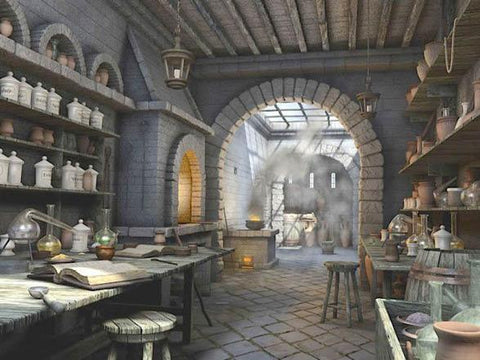
11. That by often calcining and filtering this EARTH I did at last extract about two ounces of a fine small White SALT which looked at through a good microscope seemed to have sides and angles in the same manner and figure as Rock-petre.
A Diary and Practice given by Mr. Oughtred to Mr. Thomas Henshaw, from whose MSS. I copied it. June 6th. 1668.
Rx. 3 ounces of our Spirit washed as it should be, till it be clean and of a Celestial colour, then strain it, and take 1/4 ounce of our pure Body unmixed with anything; amalgameutur laveutur usque dum ad purritatem permanent. 3 ounces of our Spirit washed and strained, and ~ ounce of pure Soul, and wash them likewise till they can be no cleaner.
Then put them all together into our Oval artificially closed, whose neck shall be so long as will serve to open and nip three times more. Which Oval shall be so great that three parts remain empty. Put it into our Three-fold Furnace in a compassing heat primi gradus, being so easy that it may be equivalent to the natural heat of the body. Then let it stand L~O days or 6 weeks, in which time our Matter will have a Superficial Blackness, our Soul animating the Spirit, and the Spirit piercing the Body for Dissolution. This done, draw the Fountain, so do with the Bath and that you leave but 1 ounce in your Oval, which proportion is One to One. Nip it artificially, and keep the Animated Spirit in calore Simplices prim! Ignite nutritius in another glass nipped. Then set the other Oval closed, in our Threefold furnace, for NOW DOTH OUR WORK BEGIN, and being so set continue it in the furnace keeping it always warm, cum igne primi gradus ad interpationem primoe formie.
The Tokens whereof is the growing and increasing of Blackness, which will be done in 90 days or near, and in 20 days after or thereabouts he will put off his mourning weeds, and as right is (exhaling moisture) challenge to himself the Second Colour of the World, the day appearing in the East all which must be done igne continuato.
Then increase thy heat usque ad secundum gradum usque ad congelationem and delbatianem5, at which time take our Waters, which till this Time thou hast nourished igne primo and quas per artificum nostram haustist in terra, which will be in all 5~ ounces or 4L. 1/8 ounces and thereof take 7 1/8 ounces for thy seamen imbibitionis in the First Rotation, and there will be 1 1/8 ounce for every imbibjtjon, keeping the rest. I mean 37 1/8 ounces of our Water in igne primo nutritiuo.
We diet the thirsty Body with this said proportion WARM, and then congeal him, and tune iterum bibat and congeletur and dealbitur septies solis calore vel igni secundi gradus, ades ut non comedat res uflus festinautur, and thus having imbibed and congealed 7 times, then is our Rotation ended, and the Matter is 15 1/8 ounces.
Then for the Second Rotation, to those 151/8 ounces of our Warm Water, and it maketh 30 1/8 ounces having now spent just half the water and left only 22 1/8 ounces for thy Imbibitions for this Second Rotation.
Shut thy Oval philosophically and begin in the West; pass to the North, igne primo continuato; until the Eclipse be past and so dawning and growing White then mayst thou anon increase the fire till it be as hot as in the bare hand thou mayst endure it; with which heat he will be white, then increase the heat ad tertium gradum, the better to whiten and congeal him. Then it being cold take our 8 1/8 ounces or 1 ounce for the making of new Sperm; and then thou leavest 22 1/8 ounces in thy Womb, which 8 1/8 ounces or 1 ounce thou shalt amalgamate with 24 1/8 ounces of our pure Spirit as at the first, strained and washed, and then as before nourish cum igne primo nutrituo that it may be fit Water to imbibe our Thirsty Body withall being in the meantime till you have made thy drink fit, thou mayst imbibe the thirsty Body being 22 1/8 ounces with your 22 1/8 ounces of Water remain- ing, having for every of the first 6 imbibitions 3 1/8 ounces, and for the 7th. 4 1/8 ounces; which thou mayst boldly, because through his manifold imbibitions and dessications he hath gotten a strong stomach, of better digestion.
In imbibing listen to Rasis, saying, “Qusties corpus imbibitur, to ties dissicatur”, and thus having shewed thy charitable devotion in imbibing the hungry and thirsty Body until thou hast at 7 draughts given him all thy drink, increase thy heat at tertuim gradum the better to congela and fix it up, arid there is an end of the Second Rotation.
For the Third Rotation, add unto the 44 1/8 ounces or 54 ounces of our last made Waters, which was in quantity 25 1/8 ounces, and our matter is then 11 ounces just, then having first Philosophically shut up thy Vessel nourish him as at the first cum igne nutritue primo, and so - to the West again, and then to the North by obscure Eclepsation igne primo semper continuato, until the rivers be dried, at which time by little and little growing whitish he will by little and little strip himself to his shirt, then increase thy heat till his chamber so hot as in thy bare hand thou mayst suffer to hold it, and so forward ad igneni tertium gradus, which augmentation of heat will fix him well. Then imbibe him with 11 ounces of our Water 7 times, and you shall have for every of the imbibitions 1 1/2 ounces, and for the 7th., 2 ounces, which draught he will easily drink without glutting he is become so strong. IMBIBE ALWAYS WITH WARM WATER AS NORTON SAYETH, all liquors should be refused which frost infecteth and should not be used. The cause why, as telleth Authors old, is BECAUSE THEIR ACTIVITY IS DULLED WITH COLD, always congealing after every imbibjtjon the better to provoke appetite, and at the last congealation augment the heat ad periodum ignis tertiigradus, that - thou mayest fix him perfectly. And then thou hast the white Elixir of the 3rd. Order, fluxible as Wax, exceeding snow in whiteness, in weight 22 ounces, frigescat ac dividutue.
And continue the other half, I mean 11 ounces in our Third fire in the Chamber philosophically shut, until he be Red, then augment the fire ad quartuin gradum (i thou darest for fear of vitrification) the better to confirm colour and fixation, for the more he is in the fire the and perfecter will his Tincture be, therefore let him rest awhile, but vitrify not, et frigescat vas gradatim. Then take out our Red Elixir, Red as Blood, which thou mayst multiply thus.
Take from these 11 ounces, 2 1/2 ounces, whereof keep 2 ounces for thy use in transmutation at thy pleasure, and with the half ounce make now milk to feed the Child. Amalgamate it with 24 ounces of our Spirit washed and strained as at the first, and now resting it 40 days or longer till having added 8+ ounces which remained of the Water, part of the 25 ounces made at the Second Rotation, thou hast in a fit Womb philosophically shut, turned the Wheel from the West to the South, where he must rest till that he be at the period of Redness and fixation. Then retrograde by degrees thy heat ad tertium gradum, and feed our Child being in weight 17 ounces, seven times with your 24 ounces of our Milk, promoting appetite after every draught, and thou shalt have for every of the four first, 3 ounces, and for every of the 3 last draughts 4 ounces, and after thy last draught direct thy heat as before, ad quartum gradum or as much as thou canat for Vitfrication, and let our Child rest the better to confirm Tincture and fixation.
There thou hast 41 ounces of our Red Elixir, which thou mayst multiply to thy lives end.
Thank God for it

The Laboratory Diary of William Oughtred
6
I. August 12th. SATURN. I put my Matter into my Oval being of a Celestial Blue colour, and so continuing him in his Chamber hermetically sealed, and warmed with our first degree of fire.
August 16th. MERCURY. It was swollen higher, about 1/3 of an inch, having a pellicule like that which is about an Embryo, of a pale colour mixed a little with yellow and Red, like the Corone about the Moon against Wet. Within that Membrane were 17 little Ampulles simmering like Butter on a small fire, and the Membranes head had bright Azure veins here and there lik e those of Bladder. This Membrane seemed to enclose the Matter round.
II. August 29th. The Ampulloe continued becoming of a Bright, shining, Saturnine colour, and so was the Membrane, and towards the circumference, quite round it was of a sub-Citrine colour, and the whole Matter seemed to swim in a little Black Water round about the Membrane, between it and the glass.
III. September 8th. VENUS. The Matter did magis in superficies nigrescered vel membrane circuente the Membrane on the one side did pucker like a purse mouth, but still with a shining Blackness, swelling, simmering, and bubbling more and more, the sub Citrine colour at the circumference growing now to Saturnine and seemed to make inwardly to his center or bottom of the Matter.
IV. 40 days and my matter swelling, bubbling and blistering, there appeared Veins of marvellous diaphanity that might easily be seen in the dark. At the making my separation, my Water was much thinner than MERCURY common, and as bright shining as the brightness of Fountain Water when the Sun gloriously shineth upon t. Notwithstanding the thickness of my water, it did stick to my glass Basin, and there came upon his face, here and there an unctuous Blackness, so that by his Unctuosity, his Quickness and his sticking to my glass. Thinner and brighter beyond measure than that which is on a Looking glass, I am right sure he is Ani-mated, and hath subtilled the Body and hath gotten some part thereof. But before I separated my Matter it had an Unctuous Black Superficies in the middle, and towards the circumference it was a Brownish Black.
And the Water verily seemed to be of a pale Saturnine colour, but being separated it was most gloriously Bright and shining marvellously, and the Body and Soul both spiritualised, which were after Separation a GREASY EARTH, WITH MARVELLOUS DIAPHANITY, loz. which I put into the Chamber philosophically sealed up. Sept. 21st.
V. October5th. JUPITER. My White greasy Earth had bubbled and swelled, so that it was not terra cum superfice plana, but montibus ebulli usque plena, changing his white diaphanity coulur into greyish. Nothing ascending but working marvellously in himself, at which time I made my heat to be of the middle of the first degree, and so continued, Saturn predominating in nostro coele.

VI. October 20th.- Oct. 23rd. My Matter had more and more swollen being of a bright Saturnine colour, very spongeous, palish, sending a bright, Crystalline dew to the Top of the glass which did guttatine descendere like a bright, thin swelling Water.
VII. December 3rd. I see two or three little round sparkling stars like the Eyes of Fishes, which sight I had seen many times 3 weeks before, but still they turned to a Blackish colour deeper than Saturn, and amongst the Stars was one exceeding bright like an Oriental Pearl. My Matter still bubbling and swelling like melted Pitch, and increasing his Blackness far deeper than Saturns coat.
Note - All the bubbling and swelling is imperceptible at the present, until it had stirred a good deal, so that though I could never perceive any motion in my Matter, yet I could easily perceive it had moved and altered.
VIII. Jan. 1 st. LUNA. My Matter seemed to dessicate and whiten, and from December 20th. being the 90th. day, it continued at its period like the Crows Bill, Blue as Lead, or as I may say, Black. Albedine quodam obfuseata, Till the said Jan. 1 st., so that it was apparent the Waters began to dry, and my Matter whitened by little and little.
IX. Jan. 11 th. MERCURY. My Matter shewed more and more drying, plainly, and White, like a fair Winters night with Stars here and there whereof one was as big as a good seed Pearl shining as bright as the Sun beams or polished Silver, being whitish, yellowish, and Azure and twinckling with marvellous diaphanity no moisture ascending as before when it sent up the Crystalline Dew.
X. Jan. 29th. MERCURY. There appeared a flood of Water coming out of my Matter’s side marvellously bright, with a shining White Yellowishness, bigger than a Bean, and dried the next day at night, so dried as if it never had been moist; and pale like all the other Earth. No Moisture at all ascending the like was on Jan. 27th. SATURN; which appeared in the morning and continued liquid all the day, but by little and little it dried and by LUNA morning it was a Solid Substance of a bright Citrine colour, but on MERCURY it was dried as the other was and of a Grey Colour mixed with Azurine like the other, with many bright sparks here and there in it.
XI. Feb. 7th. MERCURY. There came forth a flood of Water greater than the former one of my Matter, which was marvellous bright in colour like the other, but at the sides it was more Citrine or inclined towards reddish. Next day it was much dried being of a bright citrine colour. On VENUS next it was more and more dried. On LUNA it was quite dried.
Feb. 13th. MARS. There was another flood, bright and Citrine and Whiteish, and the next morning it was drie up.
Feb. 26th. SOL. There was another little flood but very thick, by reason of much dryness, for it would hardly shake. And in the Middle of my Matter was a Red Spark, like a drop of Red Blood. Next morning the flood was dry but the Red Spark continued with as deep a colour as before but more splendent.
Feb. 28th. MARS. There came out a flood thicker than before, it was of the like colour with the other, and at night it was dried; On MERCURY there came a thicker than than that, at which time I took up my glass and turned it aside a little so that the River run upon the Earth, and was presently drunk up. The Red Spark which was seen still remaining.
March 6th. There was a little coagulate as big as a good Pearl, in colour of SOL bright and shining.
March 22 nd. JUPITER. I took up my glass and turned it, and my Matter appeared in a manner Metalline bright, shining betwixt grey arid White, and the Clouds have left rising and the Rivers dried up.
April 21 st. VENUS. My Matter was turned into a Round Earth as big as a Nut and very White, which has so continued a fortnight, but now it begins to chink and gape by reason of his dryness.
May 2nd. It did more and more chink and grow ragged, like a great Stone, continuing his Whiteness still.
May 24th. I took out my inward pot for adding heat. I altered my heat 2 hours before, at which my Matter was still not without some clouds that were not dried up for lack of heat, because for 20 days together I used the 1 st. degree of heat.
May 25th. I increased my heat more to my proposed purposes.
May 30 th. I increased my heat to the period of tertium gradus and my Matter fused like Wax.
June 14th. It was again within the same degree coagulated very well. Note, that in fusion and his coagulation, he was fixed and White.
Aug. 10th. MARS. I ground my Matter and it fell to a Grey, Greasey Earth, Subtil and soft. This I did at this house and then put it into the 1 st. degree of heat.
Here ends the Diary.
Note:
- From John Aubrey’s Brief Lives, circa 1650, R. Barber, Boydell Press, 1982
- A meeting of the Royal Society under the auspices of the King
- Thanks to R.A.M.S. digital. See “Diverse Alchemical Tracts” (DIVERSETRACTS) R.A.M.S. 1982.
- Mutus Liber: see the way in which they collected the dew with pieces of linen and they wring them. There are more simple ways to collect dew thanks to the change of temperature.
- May be dealbationem? And igne primo nutritio-nis? There are a lot of improper, mistaken and incomplete latin terms in this text.
- From the Philosophical Transactions of the Royal Society British Museum MSS. Slone 698.



